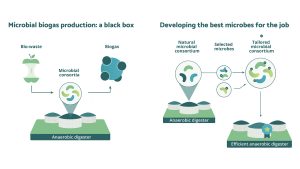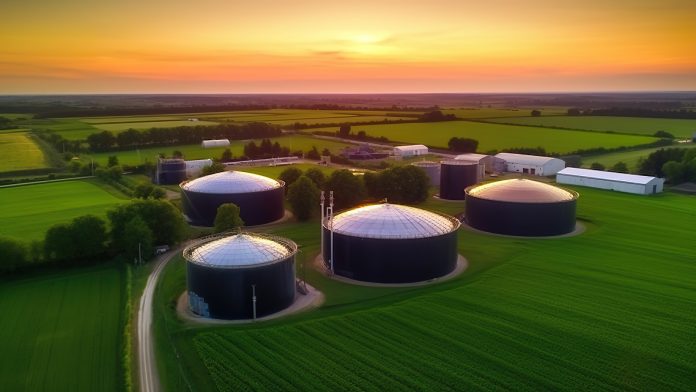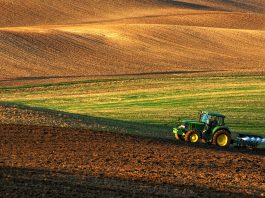With the current climate crisis, pollution, and biodiversity loss, a new bioeconomy is essential. Biogas holds critical potential for sustainable solutions.
Currently, about 10% of global energy comes from bioenergy. Biogas, specifically, is a potentially highly sustainable energy source due to it being created via the decomposition of waste products (manure, waste food, etc.) with natural bacteria.
The University of Valencia’s Professor Manuel Porcar discusses the issues facing biogas production, and the solutions from their project: MICRO4BIOGAS.
Biogas for sustainability
The urgency of transitioning towards sustainability is undeniable; implementing effective strategies and tailored approaches promises a smooth transition with dual benefits for both the environment and the economy. Urbanisation continues to drive a surge in energy demand, exacerbated by rural-to-urban migration trends. Projections from the UUNN (2018) indicate that by 2050, 68% of the global population will live in urban areas. This massive increase in urban dwellers and the expected increase in world populations within the next decades will amplify the current challenges of waste generation and management. If not disposed of properly, waste poses a significant environmental and public health risk. However, amidst these challenges lies an opportunity – biogas, if strategically planned and managed, could potentially address both the rising energy demand and the escalating waste management crisis, turning both issues into a revenue opportunity.
Revolutionising biogas production with MICRO4BIOGAS
At the forefront of sustainable energy initiatives stands anaerobic digestion (AD) of organic matter, a robust technology capable of synthesising biogas from various organic waste sources, ranging from sewage from water treatment to animal slurry or bio-waste. The main goal of AD is to produce methane, a renewable energy source that can generate electricity, heat or vehicle fuel. Biogas is a mixture of methane (CH4, 55 – 70% of the total volume), carbon dioxide (CO2, 30 – 40%) and traces of other gases. Despite the EU’s status as the world’s largest biomethane producer in 2018, producing 2.28bcm, there are many unknowns from an engineering point of view. The underlying microbial processes driving methane production remain opaque and are still considered a ‘black box’ subjected to a high degree of variability. Therefore, this industrial process presents opportunities for improvement in the systematic optimisation of yield, quality, speed and robustness.

Enhancing biogas production through innovation
Enter MICRO4BIOGAS, an ambitious 48-month Research and Innovation Action poised to revolutionise European biogas production. By integrating the use of microbial consortia that naturally inhabit anaerobic digesters, and synthetic counterparts with improved capabilities for the first time, MICRO4BIOGAS aims to develop the basis for a user-friendly kit for bioaugmentation of biogas production (activities will be implemented at TRL3 with a TRL target of five-to-six). In other words, the project’s final goal is to develop the knowledge that allows complete control of microbial key players and the inoculation of selected strains, when needed. This project, aligned with the EU Bioeconomy Strategy and the European Green Deal, contributes to Sustainable Development Goals (SDG7: Affordable and clean energy; SDG13: Climate Action), and works towards circularity, resource efficiency, and sustainability across European countries.
A collaborative effort for sustainable energy
MICRO4BIOGAS brings together a diverse consortium comprising five leading research universities, seven SMEs, one large company, one non-profit organisation, the municipal authorities from a town hall, and partners coming from six European countries. Leveraging expertise spanning the microbiological and biochemical aspects of anaerobic digesters, including the use of novel culturing techniques and the handling of –omic data, the equipment required for small-scale biogas production, the ecological, social and economic implications of this technology and its transition to political bodies), market dynamics, and science communication, this collaborative effort aims to develop a novel bioaugmentation strategy. Based on natural and synthetic microbial consortia, this strategy will set the basis for developing biotech products to increase the yield and quality of the produced biogas through the selection of microbial consortia based on their efficiency, speed, and robustness. This holistic approach contributes directly to Europe’s renewable energy landscape, promotes circular economy principles through waste valorisation, and advocates for biogas production facilities’ economic and ecologic merits. The project expects to create a positive, deep impact on both policymakers and stakeholders, contributing to the much-needed growth of this renewable fuel.
 This project has received funding from the European Union’s Horizon 2020 research and innovation programme under grant agreement No 101000470.
This project has received funding from the European Union’s Horizon 2020 research and innovation programme under grant agreement No 101000470.
Please note, this article will also appear in the 18th edition of our quarterly publication.









